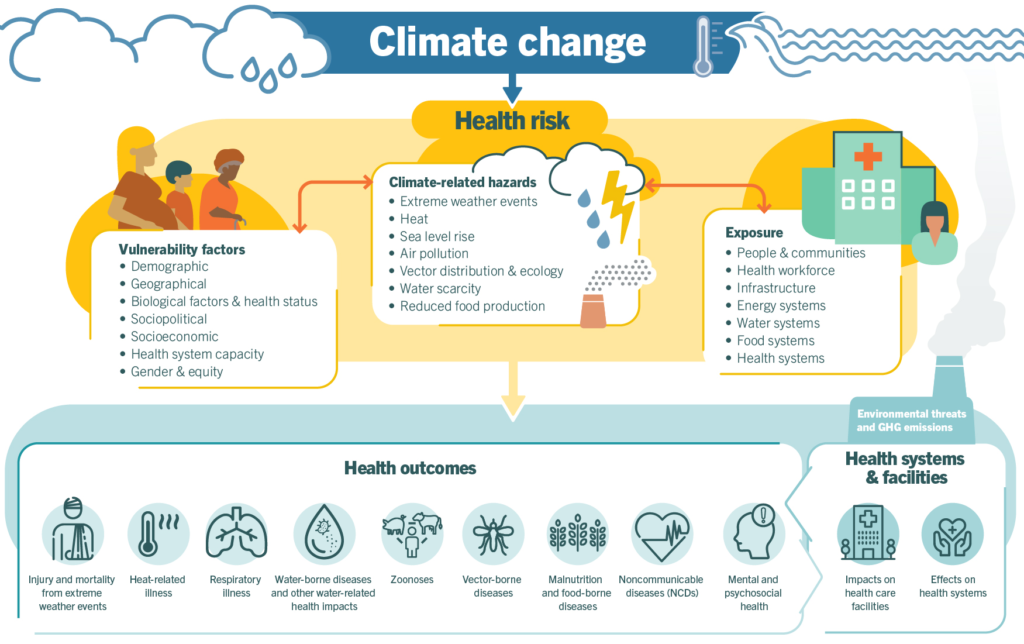
Introduction
Climate change, once a distant threat, has emerged as a pressing global health crisis. The warming planet is altering weather patterns, intensifying extreme events, and disrupting ecosystems, all of which have far-reaching consequences for human health. From heat-related illnesses to the spread of infectious diseases, the health impacts of climate change are becoming increasingly evident.
The Rising Heat: A Silent Killer
As temperatures soar, heat-related illnesses are on the rise. Heatstroke, heat exhaustion, and other heat-related conditions pose significant risks, particularly for vulnerable populations such as the elderly, children, and those with pre-existing health conditions. Prolonged exposure to extreme heat can lead to organ damage, kidney failure, and even death.

Furthermore, heatwaves can exacerbate respiratory and cardiovascular diseases. The combination of high temperatures and air pollution, often worsened by climate change, can trigger asthma attacks, chronic obstructive pulmonary disease (COPD), and heart attacks.
A Changing Climate, A Changing Disease Landscape
Climate change is altering the distribution and transmission patterns of infectious diseases. Warmer temperatures and increased rainfall can create favorable conditions for the breeding of disease-carrying vectors like mosquitoes, ticks, and flies. As a result, diseases such as malaria, dengue fever, Zika virus, Lyme disease, and West Nile virus are expanding their geographic range and increasing in incidence.
Moreover, climate change can impact food and waterborne illnesses. Floods and droughts can contaminate water supplies, leading to outbreaks of waterborne diseases like cholera and typhoid. Changes in agricultural patterns due to climate variability can affect food safety and nutrition, increasing the risk of malnutrition and related health problems.
Mental Health: A Hidden Casualty
The psychological toll of climate change is often overlooked. Extreme weather events, such as hurricanes, floods, and wildfires, can cause significant trauma, anxiety, and depression. The displacement of communities, loss of livelihoods, and uncertainty about the future can further exacerbate mental health issues.

Additionally, climate change can indirectly impact mental health by affecting social and economic factors. For example, decreased agricultural productivity and increased food insecurity can lead to stress, anxiety, and social unrest.
Adapting to a Changing Climate: Building Resilient Health Systems
To mitigate the health impacts of climate change, a multi-faceted approach is necessary. This includes:
- Strengthening Health Systems: Investing in robust health systems, including early warning systems, surveillance networks, and emergency response plans, is crucial.
- Promoting Climate-Smart Health Practices: Healthcare providers should be trained to identify and address climate-related health risks. Promoting preventive measures such as vaccination, vector control, and hygiene can help reduce the burden of infectious diseases.
- Building Climate-Resilient Infrastructure: Investing in climate-resilient infrastructure, such as flood-proof hospitals and heat-resistant housing, can protect communities from the adverse effects of extreme weather events.
- Addressing Social and Environmental Determinants of Health: Addressing underlying social and environmental factors, such as poverty, inequality, and air pollution, can enhance overall health and resilience.
- International Cooperation: International cooperation is essential to address the global nature of climate change. Sharing knowledge, technology, and resources can help countries develop effective adaptation and mitigation strategies.
Conclusion
The health impacts of climate change are far-reaching and complex. By understanding these impacts and taking decisive action, we can build a healthier and more sustainable future. It is imperative to prioritize climate change mitigation and adaptation efforts, invest in resilient health systems, and empower communities to adapt to a changing climate. Only through collective action can we mitigate the health toll of climate change and protect future generations. Sources and related content